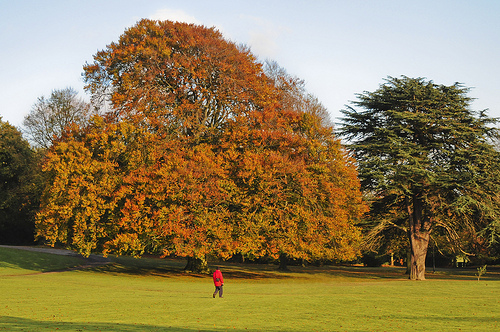Tribe Redfellow swanned across a fair bit of North Yorkshire yesterday.
This is not, of itself, a matter of any note.
We were accompanied, to the the north by a persistent rainbow — one of the best I have seen for a long while. Oddly, this was against the background of a clear blue sky and no sign of nearby rain. That was worth noting, as I here do.
So, too, were the “autumn tints”. Thanks to a very fine, and dry, and warm September, leaf-fall seems late this year. North Yorkshire may lack the crowd-appeal of all those New England maples, but it’s worth the trip.
I have little to say in favour of the lime tree. For much of the year it weeps sticky goo onto your car. Come this time of year, the leaves make the limestone payments of York slimy and — at worst — treacherous.
Horse chestnuts, having conkered, are better when they dump crisp piles of fingered leaves. On the other hand, a motor-bike passage, at speed, under fruiting horse-chestnuts can be an experience. A nut falling at 32 feet per second per second, impacting a crash helmet travelling at sixty-mph plus, is as unsettling as a wasp inside your half-unzipped-for-summer leather jacket. I’ve had both.
Then there was the sight, yesterday, of silver birches silhouetted against darker foliage, almost ghost trees in the low sunlight.
The sight of sights, though, is the solitary mature oak, turning to rust.
Time for some suggestive musical accompaniment?
Which brings me to a word.
There is a Greek noun, ἔκδυσις, “a slipping out, an escape”, which gave the mid-Victorian biologists a fancy and impressive technical term. The OED renders ecdysis as:
The action of stripping or casting off, esp. of slough or dead skin in serpents and caterpillars, or of the chitinous integument in Crustacea. Also concr. that which is cast off, slough.
I’m not strong on chitinous integuments, but I reckon we ordinary mortals might reach for “moulting” as a rough and graspable equivalent.
Then, in 1940, H.L.Mencken, writing to supplement his The American Language, proposed a metaphorical usage:
It might be a good idea to relate strip-teasing in some way … to the associated zoölogical phenomenon of molting … A resort to the scientific name for molting, which is ecdysis, produces both ecdysist and ecdysiast.
Of all the trees in all the woods in all the world, the Great English Oak is the supreme silvanian ecdysiast.



